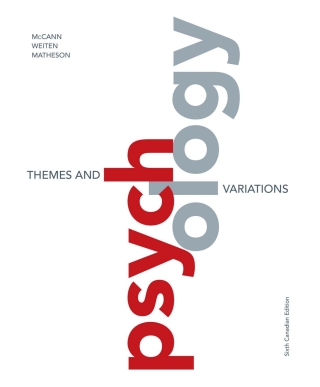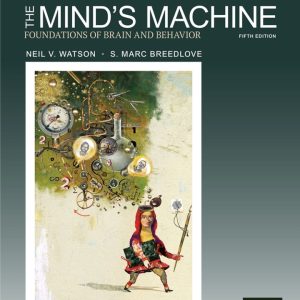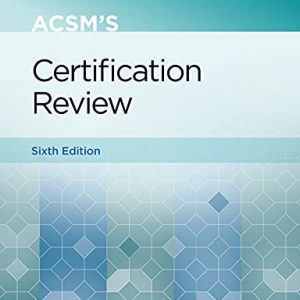Buy Psychology: Themes and Variations, 6th Edition PDF ebook by author Doug McCann, Wayne Weiten, Deborah Matheson – published by Cengage Learning Canada Inc. in 2021 and save up to 80% compared to the print version of this textbook. With PDF version of this textbook, not only save you money, you can also highlight, add text, underline add post-it notes, bookmarks to pages, instantly search for the major terms or chapter titles, etc.
You can search our site for other versions of the Psychology: Themes and Variations, 6th Edition PDF ebook. You can also search for others PDF ebooks from publisher Cengage Learning Canada Inc., as well as from your favorite authors. We have thousands of online textbooks and course materials (mostly in PDF) that you can download immediately after purchase.
Note: e-textBooks do not come with access codes, CDs/DVDs, workbooks, and other supplemental items.
eBook Details:
Full title: Psychology: Themes and Variations, 6th Edition
Edition: 6th
Copyright year: 2021
Publisher: Cengage Learning Canada Inc.
Author: Doug McCann, Wayne Weiten, Deborah Matheson
ISBN: 9780176902940, 9780176903039
Format: PDF
Description of Psychology: Themes and Variations, 6th Edition:
The sixth Canadian edition of Psychology: Themes and Variations maintains its hallmark strengths while addressing recent changes in the field, including references to almost 1,000 new articles and scholarly works. Engaging, relevant narrative frames contemporary examples that will capture and maintain the attention of anyone studying psychology in Canada. The text continues to provide a unique survey of psychology that meets three goals: to demonstrate the unity and diversity of psychology’s subject matter, to illuminate the research process and its link to application, and to make the material challenging and thought-provoking yet easy to learn. Weiten, McCann, and Hunt Matheson deliver a successful balance of scientific authoritativeness and a student-friendly approach through the integration of seven unifying themes, an unparalleled didactic art program, real-life examples, and a streamlined set of learning aids that help students see beyond research to big-picture concepts.
Table of Contents of Psychology: Themes and Variations, 6th Edition PDF ebook:
About the AuthorsBrief ContentsContentsWelcome to Psychology: Themes and VariationsSupplementsAcknowledgements for the Sixth Canadian EditionChapter 1: The Evolution of PsychologyFrom Speculation to Science: How Psychology Developed Psychology Today: Vigorous and Diversified Putting It in Perspective: Seven Key Themes Concept Chart Key Terms Multiple-Choice Questions Chapter 2: The Research Enterprise in PsychologyThe Scientific Approach to Behaviour Looking for Causes: Experimental Research Looking for Links: Descriptive/Correlational Research Looking for Conclusions: Statistics and Research Looking for Flaws: Evaluating Research Looking at Ethics: Do the Ends Justify the Means? Putting It in Perspective: Themes 1 and 7 Concept Chart Key Terms Multiple-Choice Questions Chapter 3: The Biological Bases of BehaviourThe Anatomy of the Nervous System Organization of the Nervous System Looking Inside the Brain: Research Methods The Brain and Behaviour Right Brain/Left Brain: Cerebral Laterality The Endocrine System: Another Way to Communicate Heredity and Behaviour: Is It All in the Genes? The Evolutionary Bases of Behaviour Putting It in Perspective: Themes 1, 4, and 6 Concept Chart Key Terms Multiple-Choice Questions Chapter 4: Sensation and PerceptionPsychophysics: Basic Concepts and Issues Our Sense of Sight: The Visual System The Visual System: Perceptual Processes Our Sense of Hearing: The Auditory System Our Chemical Senses: Taste and Smell Our Sense of Touch: Sensory Systems in the Skin Our Other Senses Putting It in Perspective: Themes 2, 5, and 7 Concept Chart Key Terms Multiple-Choice Questions Chapter 5: Variations in ConsciousnessThe Nature of Consciousness Biological Rhythms and Sleep The Sleep and Waking Cycle The World of Dreams Hypnosis: Altered Consciousness or Role Playing? Meditation: Pure Consciousness or Relaxation? Altering Consciousness with Drugs Putting It in Perspective: Themes 2, 3, 4, 5, and 7 Concept Chart Key Terms Multiple-Choice Questions Chapter 6: LearningClassical Conditioning Operant Conditioning Observational Learning Putting It in Perspective: Themes 3 and 6 Concept Chart Key Terms Multiple-Choice Questions Chapter 7: Human MemoryEncoding: Getting Information into Memory Storage: Maintaining Information in Memory Retrieval: Getting Information Out of Memory Forgetting: When Memory Lapses In Search of the Memory Trace: The Physiology of Memory Systems and Types of Memory Putting It in Perspective: Themes 2, 4, and 7 Concept Chart Key Terms Multiple-Choice Questions Chapter 8: Language and ThoughtLanguage: Turning Thoughts into Words Decision Making: Choices and Chances Putting It in Perspective: Themes 1, 5, 6, and 7 Concept Chart Key Terms Multiple-Choice Questions Chapter 9: Intelligence and Psychological TestingKey Concepts in Psychological Testing The Evolution of Intelligence Testing and Our Understanding of the Construct of Intelligence Basic Issues in Intelligence Testing Extremes of Intelligence Heredity and Environment as Determinants of Intelligence Putting It in Perspective: Themes 3, 5, and 6 Concept Chart Key Terms Multiple-Choice Questions Chapter 10: Motivation and EmotionMotivational Theories and Concepts The Motivation of Hunger and Eating Sexual Motivation and Behaviour The Need to Belong: Affiliation Motivation Achievement: In Search of Excellence The Elements of Emotional Experience Theories of Emotion Putting It in Perspective: Themes 2, 3, 4, 5, and 6 Concept Chart Key Terms Multiple-Choice Questions Chapter 11: Human Development across the Life SpanProgress before Birth: Prenatal Development The Wondrous Years of Childhood The Transition of Adolescence The Expanse of Adulthood Putting It in Perspective: Themes 2, 3, 4, 5, and 6 Concept Chart Key Terms Multiple-Choice Questions Chapter 12: Personality: Theory, Research, and AssessmentThe Nature of Personality Psychodynamic Perspectives Behavioural Perspectives Humanistic Perspectives Biological Perspectives Contemporary Empirical Approaches to Personality Culture and Personality Putting It in Perspective: Themes 2, 3, and 5 Concept Chart Key Terms Multiple-Choice Questions Chapter 13: Social BehaviourPerson Perception: Forming Impressions of Others Attribution Processes: Explaining Behaviour Interpersonal Attraction: Liking and Loving Attitudes: Making Social Judgments Conformity and Obedience: Yielding to Others Behaviour in Groups: Joining with Others Social Neuroscience Putting It in Perspective: Themes 1, 5, and 7 Concept Chart Key Terms Multiple-Choice Questions Chapter 14: Stress, Coping, and HealthThe Nature of Stress Major Types of Stress Responding to Stress The Effects of Stress on Psychological Functioning The Effects of Stress on Physical Health Factors Moderating the Impact of Stress Health-Compromising Behaviour Putting It in Perspective: Themes 4 and 7 Concept Chart Key Terms Multiple-Choice Questions Chapter 15: Psychological DisordersAbnormal Behaviour: Myths, Realities, and Controversies Anxiety, Obsessive-Compulsive, and Post-Traumatic Stress Disorders Dissociative Disorders Depressive and Bipolar Disorders Schizophrenia Personality Disorders Neurodevelopmental Disorders Psychological Disorders and the Law Culture, Pathology, and Trauma Putting It in Perspective: Themes 3, 4, 5, and 6 Concept Chart Key Terms Multiple-Choice Questions Chapter 16: Treatment of Psychological DisordersThe Elements of the Treatment Process Insight Therapies Behaviour Therapies Biomedical Therapies Current Trends and Issues in Treatment Institutional Treatment in Transition Mental Illness, the Revolving Door, and Homelessness Putting It in Perspective: Themes 2 and 5 Concept Chart Key Terms Multiple-Choice Questions Appendix A: Answers to Concept Checks and Multiple-Choice QuestionsAppendix B: Statistical MethodsReferencesName IndexSubject Index









